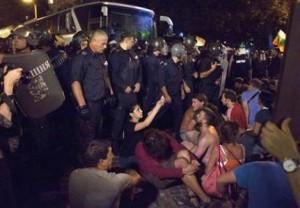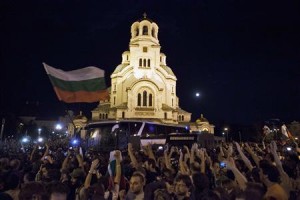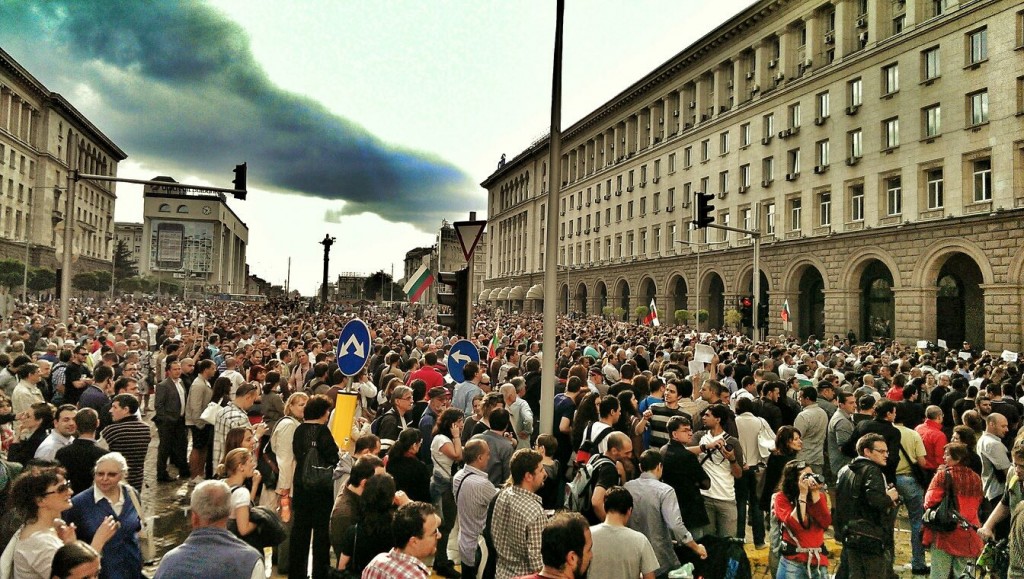Bulgaria still set to adopt the Euro despite massive protests
Bulgaria is still set to adopt the Euro on January 1, 2026, despite massive anti-government and anti-corruption protests that recently led to the Prime Minister’s resignation, though the political turmoil has created uncertainty and concerns about fair elections and potential delays, with some fearing inflation and Russian disinformation influencing the opposition. The country faces a government vacuum and upcoming early elections, but the Eurozone entry, a major EU step, remains legally on track, though public opinion is divided.
- Euro Adoption: Bulgaria is scheduled to become the 21st Eurozone member on January 1, 2026, replacing its currency, the lev.
- Protests & Politics: Recent widespread protests, initially against a controversial budget plan, evolved into demands for resignation and fair elections, leading to the center-right government’s collapse.
- Reasons for Protests: Concerns include corruption, influence of oligarchs (like Delyan Peevski), and alleged election manipulation, with accusations of Russian social media campaigns fueling anti-Euro sentiment.
- Public Opinion: About half of Bulgarians oppose the Euro, fearing price hikes, though the European Central Bank suggests inflation impact will be modest.
- Current Situation: The country lacks a government and budget for 2026, with a caretaker government expected to be appointed, but Euro entry is considered legally irreversible
Bulgarian government resigns amid protests
Protests in Bulgaria Continue
Protests in solidarity with accused Varna mayor Blagomir Kotsev – seen by supporters as targeted because of his political affiliation with We Continue the Change – Democratic Bulgaria – are continuing, with a large turnout in Sofia on July 18 and another protest scheduled for July 22.
The protests on July 18 in Sofia, Varna and Dobrich, the latest sparked by the actions by the anti-corruption commission and prosecutors against Kotsev and two others, were fuelled in particular by the appellate court July 17 decision to remand Kotsev in custody pending trial.
The July 18 protest, organised by WCC-DB – on whose ticket Kotsev won election as mayor in 2023, defeating incumbent Ivan Portnih from Boiko Borissov’s GERB, had the theme “You don’t have handcuffs for everyone”.
Kotsev is the latest in a series of politicians from WCC-DB to be targeted for prosecution. He and two municipal councillors are accused of participating in an organised crime group for corruption and money laundering.
On July 19, WCC-DB MP and former justice minister Atanas Slavov told Bulgarian National Television: “The case against Blagomir Kotsev is based on some form of political repression against the opposition”.
At national level, WCC-DB – the second-largest group in Parliament – is in opposition to the GERB-Bulgarian Socialist Party-ITN coalition, a ruling majority held in place by Magnitsky Act-sanctioned Delyan Peevski and his parliamentary group.
Slavov told BNT that there was a total lack of arguments for remanding Kotsev in custody. There is not a single piece of evidence pointing to corrupt action by the mayor of Varna, Slavov said.
He said that what the prosecution had presented in court did not justify this most severe measure.
“Our conclusion is clear – this is a form of political repression, selective, against the opposition,” he said.
“There is information that special intelligence means were used – the prosecution does not include these in the case, recordings are leaking about which it is not clear who made them – are they authentic, were they put together and most importantly – there is no proportionality. This is an abuse of procedural power,” Slavov said.
Kiril Petkov, former co-leader of WCC, told reporters on July 19 that at the previous night’s protest “they gave the same signal to him as he gave to them – 10 000 hearts”.
EU approves Bulgaria’s Euro adoption despite protests
Police Protests in Five Bulgarian Cities
Police protests continue as promised by unions. After the beginning of the week the officials made a demonstration in Sofia. Today the same happens in Varna. The demands are again for higher wages and better working conditions, bTV reported.
Protests began actively 2 days ago in the capital. They are happening despite the talks and promises on the part of representatives from the Ministry of Internal Affairs 2 weeks ago and the demands for higher salary were announced on 5 July by the police at a big rally in Sofia.
Today’s second protest will not be the last. After Varna, demonstrations are planned for Dobrich and Gotse Delchev next week and then continue in Bourgas, Blagoevgrad, Pernik and other cities.
After 40 days of protests police removes protesters from Parliament square in Sofia, Bulgaria
Comments Off on After 40 days of protests police removes protesters from Parliament square in Sofia, Bulgaria
Anti-government protests in Bulgaria’s capital have been going on for 40 days, and escalated Tuesday evening as several hundred demonstrators trapped the officials inside Parliament in a bid to oust the left-leaning government.
 (Reuters) – Hundreds of protesters built barricades around Bulgaria’s parliament, effectively trapping over 100 lawmakers, ministers, and journalists in the building for more than seven hours on Tuesday following a brief scuffle with police. Protesters pulled out sidewalk tiles and piled garbage bins to cut off roads to Bulgaria’s parliament, shouting “Mafia!” and “Resign!” and “Red Garbage!”, to keep the deputies under blockade until the Socialist-led government steps down. An earlier attempt to get deputies out of the parliament with a bus led to a scuffle with police. It was aborted after protesters threw bottles and other objects at the bus, while others sat in front of it.
(Reuters) – Hundreds of protesters built barricades around Bulgaria’s parliament, effectively trapping over 100 lawmakers, ministers, and journalists in the building for more than seven hours on Tuesday following a brief scuffle with police. Protesters pulled out sidewalk tiles and piled garbage bins to cut off roads to Bulgaria’s parliament, shouting “Mafia!” and “Resign!” and “Red Garbage!”, to keep the deputies under blockade until the Socialist-led government steps down. An earlier attempt to get deputies out of the parliament with a bus led to a scuffle with police. It was aborted after protesters threw bottles and other objects at the bus, while others sat in front of it.
 Thousands of Bulgarians have been protesting almost daily in Sofia since last month following a government decision to name a powerful media magnate as security chief, which many see as an example of private interests controlling state institutions. The government’s withdrawal of the appointment failed to quell public discontent in the European Union’s poorest country, which also is one of the bloc’s most corrupt. Seven protesters were treated for head injuries, the national radio said. Two police officers were also wounded.
Thousands of Bulgarians have been protesting almost daily in Sofia since last month following a government decision to name a powerful media magnate as security chief, which many see as an example of private interests controlling state institutions. The government’s withdrawal of the appointment failed to quell public discontent in the European Union’s poorest country, which also is one of the bloc’s most corrupt. Seven protesters were treated for head injuries, the national radio said. Two police officers were also wounded.
Bulgaria Protests – Day 12 at Independence Square in capital Sofia
Comments Off on Bulgaria Protests – Day 12 at Independence Square in capital Sofia
EVERY day, for the last twelve days, at exactly 6:30pm, Independence Square, a busy intersection in the center of Sofia, has been the starting point for a protest march that passes by the parliament building, the so-called Eagle’s bridge and the National Palace of Culture. Around 10,000 people participate every evening. They are calling for more transparency, less corruption and an end of the local oligarchs’ rule.
Only three weeks into the job, the new Bulgarian government is facing the fate of the old one. Large-scale protests are being held daily not only in Sofia but other major cities too just four months after demonstrations forced the previous conservative administration to resign. The protests were sparked by a string of dodgy appointments by the new government. The most controversial was the nomination of the Bulgarian Kim Dotcom, Delyan Peevski, a 32-year-old media mogul, as head of the powerful national security agency. A member of DPS, the ethnic Turkish party, the junior coalition partner in the Socialist-led government, Mr Peevski controls a media empire of numerous high-circulation newspapers, popular TV channels and news websites all of which tend to change allegiance according to who is in power. Mr Peevski’s political résumé is equally questionable: after spending two years as a deputy minister in a previous Socialist-led government, he was fired in 2007 and prosecuted on extortion and corruption charges. (He was eventually cleared.)
“My trust in this government is gone after this appointment,” said Rosen Plevneliev, the president, who questioned Mr Peevski’s “reputation and competence”. As the protests gathered speed, Mr Oresharski admitted the appointment was a mistake and parliament reversed the decision.
But the U-turn failed to appease the protesters. They are now demanding the resignation of the whole government as well as changes in the electoral law to allow smaller parties to enter parliament. Unlike the demonstrations earlier this year, the current rallies are largely peaceful. More and more members of the middle class are joining the protests, including popular actors, writers and musicians as well as families with babies and strollers.
“We feel that nobody is steering the boat,” says Mihail Vuzharov, one of the protestors who is a marketing specialist at a medical IT startup. “In fact, the boat has been sinking for decades.” Therefore, adds Justine Toms, a business-development manager in Sofia, “we are protesting against the people who should be in jail and are instead appointed at high posts in the state.” Most Bulgarians tend to agree with Mr Vuzharov and Ms Toms: over 80% say they support the protests, according to a poll by Alpha research. Today sixty prominent intellectuals, lawyers, journalists and human rights activists posted online a “charter for disbanding the plutocratic model of the Bulgarian state” calling for genuine democracy and the rule of law .
The wide backing by Bulgaria’s society (the educated elite in particular) makes the situation extremely tough for the government according to Tihomir Bezlov, political analyst with the Center for the Study of Democracy in Sofia. Most analysts agree that it won’t be able to serve its full four year term. In fact, the odds were against the government of Mr Oresharski from the very beginning. The Socialist party was able to form a cabinet only because GERB, the ex-ruling party of Boiko Borisov which won the May 12th snap elections, was unable to muster a parliamentary majority. With only half of the votes in parliament, the Socialists and their partners from DPS were left reliant on the unpredictable, ultra-nationalist Ataka party.
After twelve days of protests and with new ones planned for the coming weeks, the risk of yet another early election is increasing. Demonstrators will continue to gather at Independence Square every evening…
New Protests in Bulgaria over New Security Chief
Comments Off on New Protests in Bulgaria over New Security Chief
BBC News: Opposition MPs in the Bulgarian parliament have protested after a media tycoon was appointed to head the national security agency.
Delyan Peevski, 32, a member of the country’s Turkish minority party, was voted into the post without a debate by the ruling Socialists and their allies. He had been nominated by the new Prime Minister, Plamen Oresharski. President Rosen Plevneliev demanded a review of the vote, questioning Mr Peevski’s “reputation and competence” as a crowd of thousand protesters gathered outside parliament in the capital, Sofia.
Mr Peevski joined a Socialist-led government in 2005 as deputy emergency response minister but was sacked two years later and investigated over corruption allegations. The investigation was later dropped. The Socialists have been governing in a fragile minority government as a result of last month’s general election, which followed unrest over the country’s economic crisis.
External specialist: Mr Oresharski has defended the appointment of Mr Peevski, saying Bulgaria needs to take serious steps to stop organised crime and smuggling and he is best suited for the job, despite lacking experience. “Peevski was chosen because he is not part of the system and we deliberately looked for such an external specialist so that he can restructure it,” he told reporters.
However, the speed of the appointment has raised questions. British Ambassador Jonathan Allen wrote on Twitter: “The appointment has been rushed through with no hearings, debate or opportunity to find out about candidate. Why?” President Plevneliev, from the Gerb party which lost the election, said the decision would have “longstanding negative consequences for Bulgaria”.









